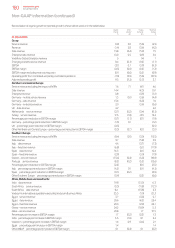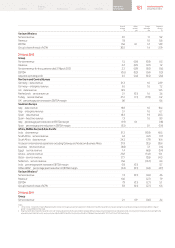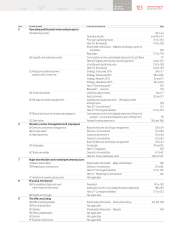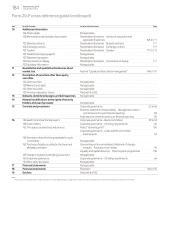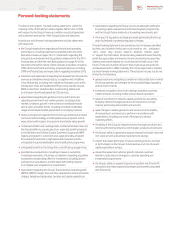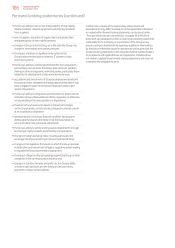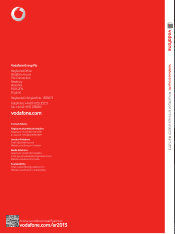Vodafone 2013 Annual Report Download - page 189
Download and view the complete annual report
Please find page 189 of the 2013 Vodafone annual report below. You can navigate through the pages in the report by either clicking on the pages listed below, or by using the keyword search tool below to find specific information within the annual report.
2G 2G networks are operated using global system for mobile (‘GSM’) technology which offer services such
as voice, text messaging and basic data. In addition, all the Group’s controlled networks support general
packet radio services (‘GPRS’), often referred to as 2.5G. GPRS allows mobile devices to access IP based data
services such as the internet and email.
3G A cellular technology based on wide band CDMA delivering voice and faster data services.
4G/LTE 4G or long-term evolution (‘LTE’) technology offers even faster data transfer speeds than 3G/HSPA.
Acquisition costs The total of connection fees, trade commissions and equipment costs relating to new customer connections.
ADR American depositary receipts is a mechanism designed to facilitate trading in shares of non-US companies
inthe US stock markets. The main purpose is to create an instrument which can easily be settled through
USstock market clearing systems.
ADS American depositary shares are shares evidenced by American depositary receipts. ADSs are issued
by a depositary bank and represent one or more shares of a non-US issuer held by the depositary bank.
The main purpose of ADSs is to facilitate trading in shares of non-US companies in the US markets and,
accordingly, ADRs which evidence ADSs are in a form suitable for holding in US clearing systems.
AGM Annual general meeting.
AMAP The Group’s region: Africa, Middle East and Asia Pacic.
AOP Adjusted operating prot. Group adjusted operating prot excludes non-operating income of associates,
impairment losses, and other income and expense.
Applications (‘apps’)
Apps are software applications usually designed to run on a smartphone or tablet device and provide
a convenient means for the user to perform certain tasks. They cover a wide range of activities including banking,
ticket purchasing, travel arrangements, social networking and games. For example, the MyVodafoneapp lets
customers check their bill totals on their smartphone and see the minutes, texts and data allowance remaining.
ARPU Average revenue per user.
Capital expenditure (‘capex’) This measure includes the aggregate of capitalised property, plant and equipment additions and capitalised
software costs.
CDMA This is a channel access method used by various radio communication technologies.
Churn Total gross customer disconnections in the period divided by the average total customers in the period.
Cloud This means the customer has little or no equipment at their premises and all the equipment and capability
is run from the Vodafone network instead. This removes the need for customers to make capital investments
and instead they have an operating cost model with a recurring monthly fee.
Controlled and jointly controlled Controlled and jointly controlled measures include 100% for the Group’s mobile operating subsidiaries and
the Group’s proportionate share for joint ventures.
Customer costs Customer costs include acquisition costs, being the total of connection fees, trade commissions and
equipment costs relating to new customer connections, and retention costs, being the total of trade
commissions, loyalty scheme and equipment costs relating to customer retention and upgrades, as well
as expenses related to ongoing commissions.
Depreciation and other
amortisation
The accounting charge that allocates the cost of a tangible or intangible asset to the income statement
over its useful life. This measure includes the prot or loss on disposal of property, plant and equipment and
computer software.
Direct costs Direct costs include interconnect costs and other direct costs of providing services.
Enterprise The Group’s business customer segment.
EBITDA Operating prot excluding share in results of associates, depreciation and amortisation, gains/losses on the
disposal of xed assets, impairment losses and other operating income and expense.
Emerging markets Vodafone entities are India, Vodacom, Egypt, Turkey, Ghana, Qatar and Fiji.
Fixed broadband customer A xed broadband customer is dened as a customer with a connection or access point to a xed line
datanetwork.
FRC Financial Reporting Council.
Free cash ow Operating free cash ow after cash ows in relation to taxation, interest, dividends received from associates
and investments and dividends paid to non-controlling shareholders in subsidiaries but before licence
and spectrum payments. For the year ended31March 2013 other items excluded the income dividend
received from VZW in December 2012 and payments in respect of a tax case settlement. For the year ended
31 March 2012 payments in respect of a tax case settlement, tax relating to the disposal ofour 24.4% interest
in Polkomtel, the income dividend received from VZW in January 2012 andthe return of the court deposit
made in respect of the India tax case are also excluded.
FCA Financial Conduct Authority (previously Financial Services Authority).
HSPA+ An evolution of high speed packet access (‘HSPA’) or third generation (‘3G’) technology that enhances the
existing 3G network with higher speeds for the end user.
Impairment A downward revaluation of an asset.
Interconnect costs A charge paid by Vodafone to other xed line or mobile operators when a Vodafone customer calls
acustomer connected to a different network.
ICT Information and communications technology.
IP Internet protocol (‘IP’) is the format in which data is sent from one computer to another on the internet.
M2M Machine-to-machine. M2M communications, or telemetry, enable devices to communicate with one another
via built-in mobile SIM cards.
Denition of terms
187 Vodafone Group Plc
Annual Report 2013
Overview Business
review Performance Governance Financials Additional
information





